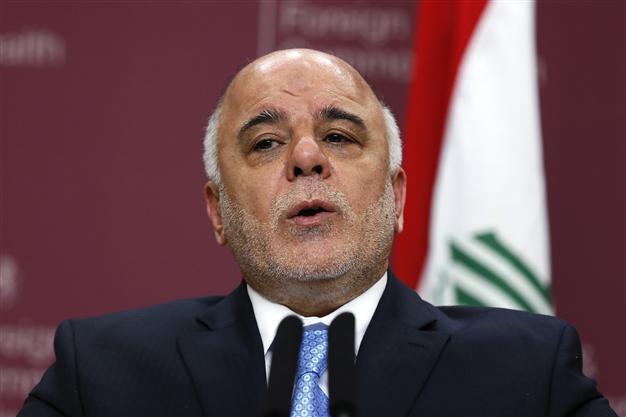Iraq PM orders end to years-old Baghdad curfew
BAGHDAD - Agence France Presse

Iraqi Prime Minister Haider al-Abadi has ordered an end to a years-old nightly curfew in Baghdad. REUTERS Photo
Iraqi Prime Minister Haider al-Abadi has ordered an end to a years-old nightly curfew in Baghdad in a bid to ease restrictions on daily life despite persistent violence, officials said Feb. 5.Lifting the curfew is a major change to a longstanding policy aimed at curbing violence in the capital by limiting movement at night, which has failed to stop the frequent bombings that hit Baghdad.
"The prime minister ordered that the curfew in the city of Baghdad be completely lifted starting from this Saturday," said Brigadier General Saad Maan, the spokesman for the Baghdad Operations Command.
Abadi wants there "to be normal life as much as possible, despite the existence of a state of war," his spokesman Rafid Jaboori said, referring to the battle against the Islamic State jihadist group.
This is "part of the response to terrorism and the war against it," he said.
A statement from Abadi's office said he had also directed that important streets in the capital be opened "to facilitate the movement of citizens," and that the Adhamiyah and Kadhimiyah neighbourhoods of north Baghdad be "demilitarised zones."
It did not provide details on which streets would be opened, or on what the plan for the two adjacent neighbourhoods -- the former mainly Sunni, the latter Shiite -- entails.
The army and police checkpoints across Baghdad cause massive traffic jams that are a major source of irritation for Iraqis and often follow lax security procedures that are unlikely to hamper the movement of militants.
The hours the curfew has been in force have varied over the years, but it has most recently lasted from midnight to 5:00 am.
The decision to lift it comes as Iraqi forces battle to regain ground from IS, which spearheaded an offensive that overran large areas north and west of Baghdad last June.
It was initially feared that Baghdad itself could be attacked by the militants.
But federal troops that initially wilted under the offensive have regained significant territory with support from Shiite militiamen, Sunni tribesmen and US-led air strikes.
In the north, forces from Iraq's autonomous Kurdish region are also making gains against IS, and evidence of atrocities likely committed by the group has been found in retaken areas.
Gains by security forces have not stopped militants from carrying out attacks in Baghdad, which they were able to do even when violence was at a low ebb in 2011-20112.
Bombs still ripped through markets, cafes and crowded intersections, and militants also frequently targeted security forces in the capital.
Scrapping the curfew does away with a measure that restricted the lives of ordinary people while doing little to stop the near-daily attacks they have suffered for years.
















